#french history
Text
JACOBIN FICTION CONVENTION MEETING 37: CHÉVALIER (2022)

1. The Introduction
Well, hello there, Citizens! I’m back and I hope you missed me! Sorry for the multiple delays and all, but luckily I’m back at it now!!!
Okay, so this movie has been on my radar ever since it got announced. A story featuring a real Black man who lived during Frev? Sign me up! This has excellent potential and also, to my knowledge, at least a partially Black crew so we get more representation of marginalized groups in crews and on the screen!
At least, those were my thoughts before I actually watched the movie, but we’ll get to whether it was a good media piece later.
I found the movie on Russian language streaming websites, but it’s available on Amazon Prime and Disney Plus for those who would like to watch the original English version.
This review is dedicated to @idieonthishill , @vivelareine (who has a review that unpacks the movie from a historical pov and is welcome to add to the review 😊), @theravenclawrevolutionary , @sansculottides , @citizentaleo , @saintjustitude , @avergehistoryenjoyer , @lanterne and @jenxiez .
Okay, let the Jacobin Fiction Convention reopen!
2. The Summary
The movie tells a story of a real man, Joseph Bologne aka Chévalier de Saint-Georges. Recognized son of a white French nobleman and an enslaved black woman, Bologne must navigate the cutthroat world of the Parisian high society, dealing with racism and trying to reconcile his “white” upbringing with his African roots.
Sounds interesting, but let’s see how the premise was handled.
3. The Story
The Introduction scene - a musical duel between Mozart and Bologne, was actually quite good in my opinion. So were the other beginning scenes of kid Bologne growing up in France as an aristocrat and being bullied by his white peers, plus his father telling him not to let society break him.
These scenes establish quite well that Bologne has to carve out a place for himself among French nobility and make a lot of effort to get even a hint of acceptance. Sounds like a nice setup, right? Well, unfortunately at times Bologne in the movie doesn’t seem to have much agency at all.
For example, his title is granted to him by Marie-Antoinette basically on a whim, handed to him on a silver platter because the queen was impressed by his fencing skills, which in my opinion isn’t enough to show a character who has to work hard to be accepted. I think it would’ve been better if Bologne had at least several impressive fencing performances to prove himself and show more of his skills.
On the flip side, there are characters who have a bit too much agency. For example, in the story it’s Marie Antoinette who is calling all the shots and giving all the orders in France, even though Louis is alive and well. It’s definitely jarring to see how people say “by the order of the queen” when the king should be the one mentioned instead.
I didn’t care much for the love triangle storyline, but it’s my own personal preference and also the fact that it, like many parts of the story, isn’t all that nuanced. So yeah, very bland and boring.
Yes, Citizens, unfortunately nuance has officially left the chat, especially when it comes to the main character. See, at first Bologne doesn’t give a shit about poverty and famine plaguing France. He is enjoying his cushy life and his friendship with the queen of France instead. However, you know what makes him join the Jacobins? A fucking PERSONAL FALLING OUT WITH THE QUEEN. Not promises of abolishing slavery or granting rights to black people, not his own ideals… Just fucking pettiness!
It would have been much better if he didn’t have a falling out with Marie Antoinette and signed up for fighting with the Republicans because he genuinely wanted to do what was right, not due to personal beef. Especially since that was why he joined Frev in reality – the real Bologne made a choice to do the right thing simply because it seemed to be the right thing to him. Not out of petty desire to get back at the queen.
Also, the conflict between Bologne and his mother about how he is acting “too white”… eeeehh. To me it felt very anachronistic but maybe I’m wrong and there is more nuance missing because EVERYONE at court had to carry themselves in a certain way to make it. If you couldn’t do it, you were socially FUCKED. Besides, Nanon (the mother) and her friends crack really mean jokes about Bologne being “too white”, which is… well, an INTERESTING way to endear him to his mother’s culture…
The movie is juggling admittedly anachronistic theme about black culture, anti-slavery message, court drama and love triangles… and the juggling is done quite sloppily too, I’m afraid.
Also, just to illustrate how inaccurate this movie is, the events of 1789 are shown happening in 1776 for some reason, which shows just how much the creators didn’t give a shit about research.
Moving on.
4. The Characters
I really didn’t care for Bologne to be honest. He shows selfishness and pettiness, doesn’t have enough agency in the story and is also very inconsistent. After falling out with Marie Antoinette, he claims he defended her, which… he didn’t! At least it’s not shown in the movie! What the fuck happened to “show, don’t tell”?! Also, his incredible talents aren’t really shown in the way they could’ve been, more on that in the soundtrack section. A missed opportunity, really.
Nanon, Bologne’s mother, is a real embodiment of the themes of slavery and trauma present in the the movie. She merely exists to push him to embrace his African heritage and to remind him that he will never be truly accepted by other nobles. I honestly wish there was more to her character, because she ends up being little more than a walking theme embodiment.
Marie Antoinette here is a capricious, fair weather friend. She CLAIMS to support Bologne, but does it in indirect ways out of fear that nobles wouldn’t appreciate her openly backing a black man. Even though she is an absolute monarch so she can afford to show her support more openly. Actions speak louder than words, and she is clearly not a true ally of Bologne.
Marie Joséphe, Bologne’s love interest, is a woman trapped in a miserable marriage and yearning to act in Bologne’s operas. While I do sympathize with her, I believe that there really isn’t much depth to her either. We just don’t learn much about her. This is becoming a common theme…
Also, just as a side note while we’re talking about characters, many white characters in the movie are shown as mere flat caricatures. I can understand why, but, again, this doesn’t show nuance as in reality, while Bologne definitely had to deal with racism, he was not only accepted, but adored as a celebrity, but we don’t see that reflected in the attitudes of other people towards him. Because apparently the brains of the spectators will implode when they see nuance in a modern movie, it seems.
5. The Setting
Personally I wasn’t that impressed by the costumes or the settings. I’ve seen much better ones. Nothing bad, but nothing outstanding either.
6. The Soundtrack
Where the fuck is actual music from that time period?! Where is music by Bologne himself?! It’s a fucking missed opportunity and I don’t know what prevented the creators from including the music written by the MAIN DAMN CHARACTER into a biopic about him. A shame that they missed yet another opportunity.
7. The Conclusion
Honestly… I can’t say much when it comes to what this movie is fucking about. The story is bland, lacks nuance, doesn’t follow basic historical facts and is pulled in a million directions.
For a movie about an obscure figure, it doesn’t show much of the things Bologne was known for and at times even strips him of agency. We need to have better POC representation, because this is just not it.
The movie is mediocre, bland and forgettable. Don’t waste your time on it.
With that, I declare today’s meeting of the Jacobin Fiction Convention to be over. Thank you for your patience and support during this hiatus of mine.
Stay tuned and stay safe!
Love,
Citizen Green Pixel
#chevalier 2022#joseph bologne#jacobin fiction convention#french history#black history#french revolution#marie antoinette
21 notes
·
View notes
Text


I love how Brian Cox is basically leftist Logan Roy in real life.
21 notes
·
View notes
Text
“Was I not devoted to the revolution from the very beginning? I... have sacrificed everything for the republic. I deserve the name of a patriot... Lend me your ears... But if my enemies are after my life—I do not think highly of it and have often despised it. Indeed, only the thought that my life could be of use to the nation makes me carry its burden courageously!”
— Napoleon, to the Convention from the prison at Antibes, letter of August 1794.
Source: Joe H. Kirchberger, The French Revolution and Napoleon: An Eyewitness History
#Napoleon#napoleon bonaparte#napoleonic#napoleonic era#first french empire#french empire#history#france#Antibes#19th century#french revolution#french history#correspondence of Napoleon#Joe H. Kirchberger#Kirchberger
21 notes
·
View notes
Text
for God’s Sake, my dear General, take Care of Your Health, don’t devote Yourself So much to the Cabinet, while Your Habit of life Has from Your Young Years, Accostumed You to a constant Exercise. Your preservation is the life of Your friends, the Sallvation of Your Country—it is for You a Relligious duty Not to Neglect Any thing that May Concern Your Health—I beg You will let me oftener Hear from You
The Marquis de La Fayette to George Washington, August 23, 1790
“To George Washington from Lafayette, 23 August 1790,” Founders Online, National Archives, https://founders.archives.gov/documents/Washington/05-06-02-0146. [Original source: The Papers of George Washington, Presidential Series, vol. 6, 1 July 1790 – 30 November 1790, ed. Mark A. Mastromarino. Charlottesville: University Press of Virginia, 1996, pp. 315–319.] (03/26/2024)
#marquis de lafayette#la fayette#french history#american history#history#letter#founders online#george washington#1790
21 notes
·
View notes
Text
By the way, if any of you, like me, are nerds who love maps, I highly recommend checking out the Turgot map. I won't link it or tumblr will eat this post, but you can find it just by searching Wikipedia - it's an incredibly detailed 3D map of Paris made in the 1730s, and by "incredibly detailed," I mean
incredibly
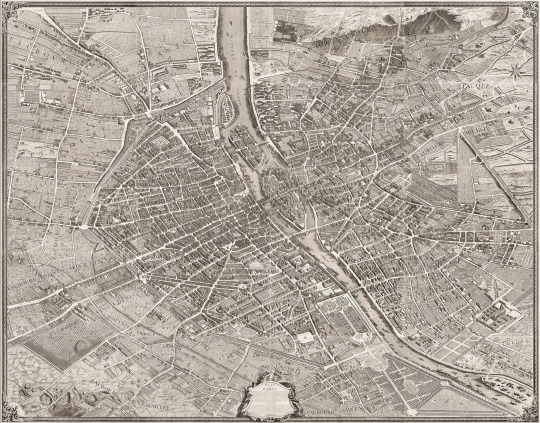
incredibly

INCREDIBLY
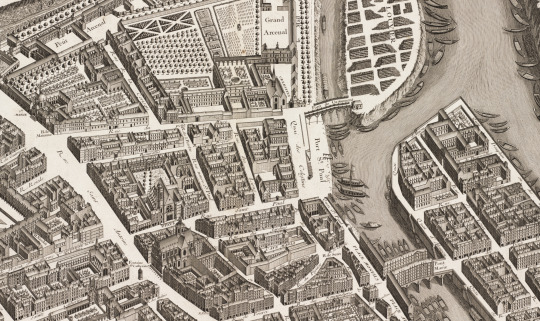
DETAILED!

Look, there's Notre Dame! Individual trees! Individual lampposts! Individual boats!! (Some of them even have little people in lol, though clearly not to scale)
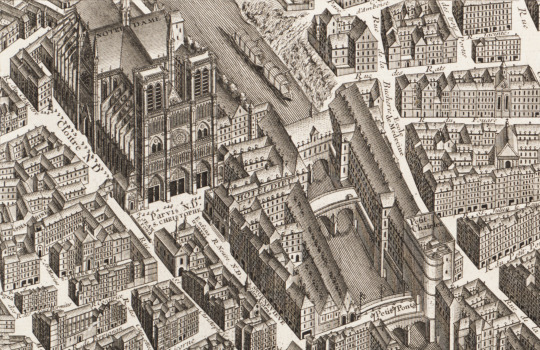
The full scan is over 35,000 pixels wide, guys! That's over 10 feet of map!! All drawn and engraved by hand! I'm freaking out a little! What an absolutely amazing piece of history & art!
#I'm slowly collecting stupidly detailed maps of Paris for book research but this is the wildest one I've found so far#and in 3D! It really gives you a sense of the city like nothing else#history#french history#Paris#maps
16K notes
·
View notes
Text
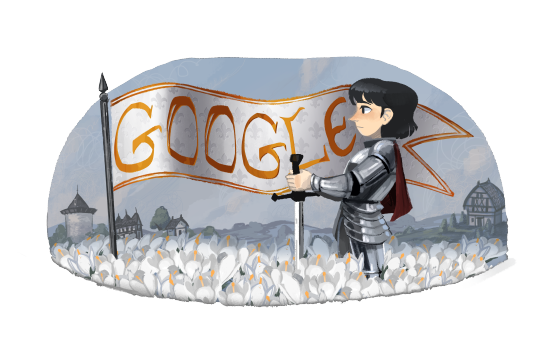
Joan of Arc Google Doodle
#joan of arc#jeanne d'arc#my art#art#artists on tumblr#artists of tumblr#france#french history#doodle#painting#digital painting
410 notes
·
View notes
Text
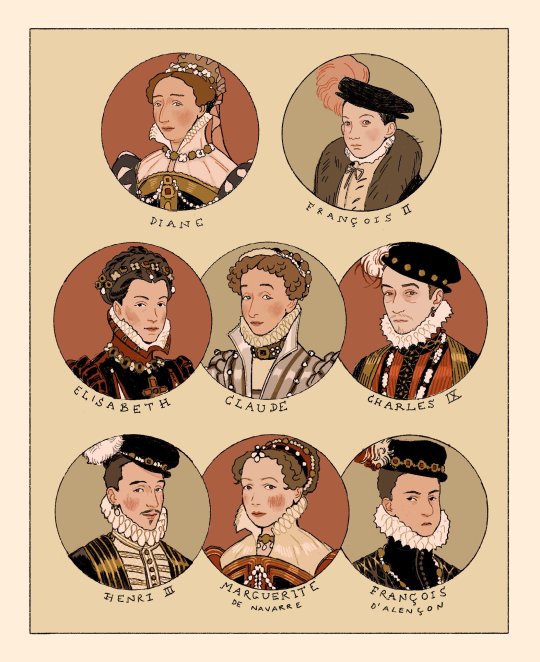
Last of their name
#house of valois#french history#charles ix#henri iii#françois d'alençon#marguerite de navarre#claude de france#elisabeth de france#diane de france#françois II#la reine margot
1K notes
·
View notes
Text
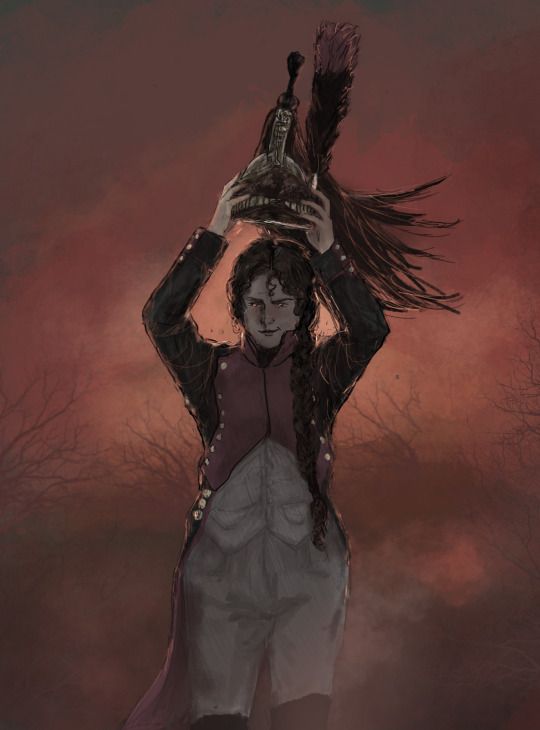
For International Women's Day — a portrait of a brave, invincible and independent woman who officially served in the army (both revolutionary and during the empire), who called Napoleon a "gypsy child", who was captured more than once, who adored her long hair, who once ate a delicious fried ram with Augereau (because of which she was late and was sent to the guardhouse), who organized a shelter for dogs during the war in Spain — the little dragoon "Sans-Gêne", Marie-Thérèse Figueur.
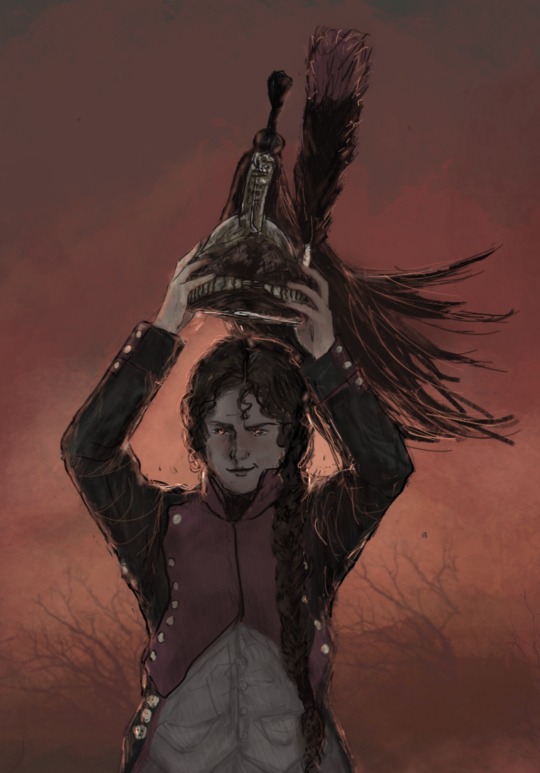
#history#french history#history art#napoleonic#therese figueur#madame sans gene#napoleon#napoleon bonaparte#french revolution
310 notes
·
View notes
Text
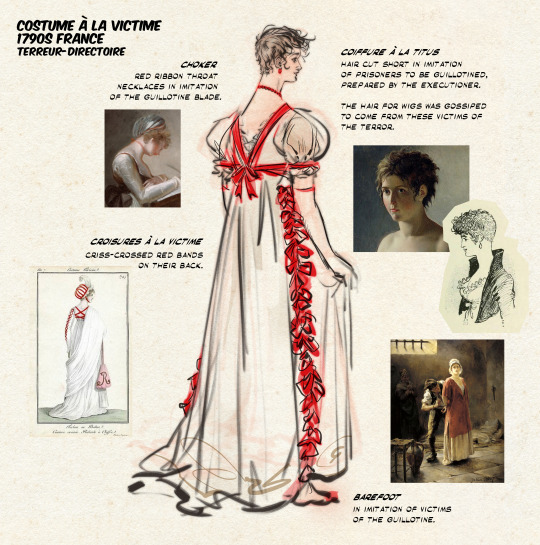
fell down the "bals de victimes" folklore rabbit hole (balls for those who lost family members to the guillotines in which guests would dress in the macabre style of the victims)... anyways, im ready to pitch my eyes wide shut au set in france under the throes of the Reign of Terror (directed by guillermo del toro, obviously)
1K notes
·
View notes
Text
Time Travel Question : Murder and Disappearance Edition I
Given that Judge Crater, Roanoke, and the Dyatlov Pass Incident are credibly solved, though not 100% provable, I'm leaving them out in favor of things ,ore mysterious. I almost left out Amelia Earhart, but the evidence there is sketchier.
Some people were a little confused. Edward V and Richard of Shrewsbury are the Princes in the Tower.
#Time Travel#Famous Murders#Jack the Ripper#La Bete du Gevaudan#Gandillon Family#Werewolves#William Rufus#King William II#Edward V#Richard of Shrewsbury#French History#English History#Early Modern Europe#Victorian England#Lord Darnley#Mary Queen of Scots#Scottish History#Amy Robsart#Lord Dudley#The Sodder Children#The Somerton Man#Australian History#Prime Minister Harold Holt#Elizabeth Short#The Black Dahlia
488 notes
·
View notes
Text
883 notes
·
View notes
Text

Robert Doisneau, Eiffel Tower, 1965
#robert doisneau#french art#french artist#french photographer#french photography#art photography#eiffel tower#tour eiffel#paris france#paris#french history#modern art#art history#aesthetictumblr#tumblraesthetic#tumblrpic#tumblrpictures#tumblr art#aesthetic#beauty#tumblrstyle
157 notes
·
View notes
Text
"As boys and men went out on the boats — “my grandfather was nine when he started,” said the local historian Arlette Julien — girls and women were in the canneries, some from the age of eight, some up to 80. They’d be called in at any time of day or night, whenever the boats came in: in pre-fridge days, sardines needed treating fast.
Dressed in long heavy skirts and clogs, the women would work up to 18 hours non-stop, go home at midnight and then be called back in at 4am. The floors were filthy with mud and sardine guts, the women’s hands wrecked by brine, toilets often a distant rumour … all for 80 centimes an hour. That 80 centimes was just enough to buy a litre of milk, half the wage of a professional washerwoman. All ages earned the same amount.
The strike struck on November 21 and within days 2,100 people were out, 1,600 of them women. The Communist mayor Daniel Le Flanchec pulled the town council behind the strike. He called in Communist support from all over France.
Thus was assured a level of organisation not experienced by earlier French strikes. Funds were raised, soup kitchens sorted, Christmas presents for children arranged and marches assembled. The strike became a national issue.
Finally, though, and after six weeks, the cannery owners were forced to negotiate. They conceded overtime payments, a ban on work for girls under 12 — and a pay rise to one franc an hour. Men got 50 centimes more. “Equal pay wasn’t an issue. The movement was born of desperation,” the history teacher Françoise Pencalet said. “The women simply wanted a little more than what they had.”
#history#women in history#women's history#women's history month#20th century#working women#bretagne#france#french history#upthebaguette#historyblr#historical figures
137 notes
·
View notes
Text







Women in History Month (insp) | Week 1: Leading Women
#historyedit#perioddramaedit#women in history#women in history month challenge#lady of birka#marie madeleine d'aiguillon#empress gongsheng#elizaveta petrovna#jayadevi#zenobia of palmyra#margrete of denmark#viking age#scandinavian history#french history#cambodian history#song dynasty#chinese history#russian empire#3rd century#7th century#8th century#10th century#14th century#15th century#16th century#17th century#18th century#my edits#mine
155 notes
·
View notes
Text
a collection of moments from the translated trial of Joan of Arc from 1431 that are fucking iconic of her:
‘And then did We forbid Jeanne, without Our permission, to leave the prison which had been assigned to her in the Castle, under pain of the crime of heresy.
“I do not accept such a prohibition,” she answered; “if ever I do escape, no one shall reproach me with having broken or violated my faith, not having given my word to any one, whosoever it may be.”’
“Was he naked?”
“Do you think God has not wherewithal to clothe him?”
“I have always answered that you will not drag this from my lips. Go and ask it of him.”
“You shall not have anything more at present.” (she gave variations of this response all throughout the trial/examinations. basically if she felt that god had not given her permission to speak on a subject, she just wouldn’t. she did not seem to acknowledge the authority of those questioning and judging her at all, which makes sense. She also frequently replied “that is not your Case” which I think is basically her saying that’s not relevant to this trial so none of your business.)
“I promise to speak truth on what touches your Case; but the more you constrain me to swear, the later will I tell you.”
“Who induced you to have cited a man of the town of Toul on the question of marriage?”
“I did not have him cited; it was he, on the contrary, who had me cited; and then I swore before the Judge to speak the truth. And besides, I had promised nothing to this man.”
“If it should be that I am taken to Paris, grant, I pray you, that I may have a copy of my questions and answers, so that I may lend them to those at Paris, and that I may be able to say to them: ‘Thus was I questioned at Rouen; and here are my answers : in this way, I shall not have to trouble again over so many questions.”
“Did you give, or cause to be given, money to him who took Franquet?”
“I am not Master of the Mint or Treasurer of France to pay out money so.”
“Upon the oath that you have taken, tell us, how did you think to escape from the Castle of Beaulieu between two planks of wood ?”
“Never was I prisoner in such a place that I would not willingly have escaped. Being in that Castle, I should have shut my keepers in the tower, if it had not been that the porter espied me and encountered me.”
“If I had leave to go in woman’s dress, I should soon put myself back in man’s dress and do what God has commanded me: I have already told you so. For nothing in the world will I swear not to arm myself and put on a man’s dress; I must obey the orders of Our Lord.”
“Do you know if Saint Catherine and Saint Margaret hate the English?”
“They love what God loves: they hate what God hates.” (I know that this is all about nationalism during war but this is still hilarious to me. like goddamn, okay! Also I have to note that the examiner follows up with “does God hate the English?” and she basically says she cannot know but I want does God hate the English on a tshirt)
“I had that ring in my hand and on my finger, when I touched Saint Catherine as she appeared to me.”
“What part of Saint Catherine?”
“You will have no more about it.”
“Did you ever kiss or embrace Saint Catherine or Saint Margaret?”
“I have embraced them both.”
“Did they smell good?”
“It is well to know, they smelled good.”
“In embracing them, did you feel any heat or any thing else?” (yo WHY is this examiner such a FREAK stop being weird my dude!!!)
“I took it of my own free will, and with no constraint: I prefer a man’s dress to a woman’s dress.” (mood)
So struck by how she really did not see those prosecuting (and persecuting) her as valid authorities and she was not subtle about it. However you see Joan and the voices she heard, she was a brave and bold and relatably snarky 19 year old telling the people who did not accept her belief nor her existence as we would likely now see as a mentally ill/psychotic young woman in society to fuck off.
583 notes
·
View notes
Text
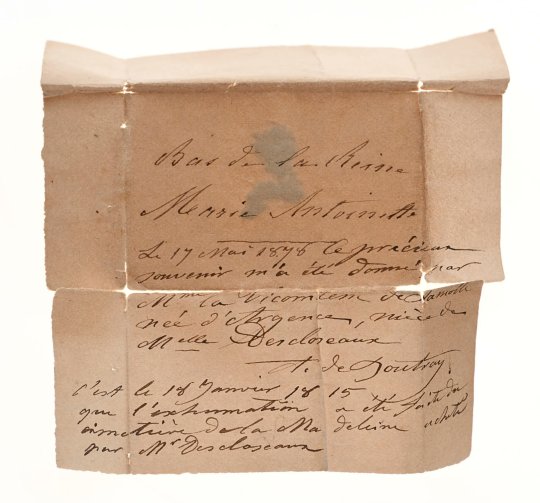
A fragment of a stocking said to have been worn by Marie Antoinette. The inscription notes it was given in 1878 by someone in the Descloseaux family. Louis Descloseaux had purchased the Madeleine cemetery, where Louis XVI and MA's bodies were said to be buried.
During the Restoration, Descloseaux gave the information about the location of the bodies to Louis XVIII. The bodies, or what remained of them due to the use of quicklime, were exhumed. Among the remains in what was said to be the Queen's grave was a stocking and elastic garter.
If the fragment is legitimate, it would presumably be from a stocking she wore to her execution.
Being sold via Osenat.
221 notes
·
View notes